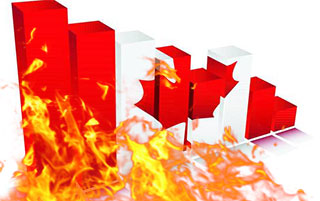The incredible human tragedy from the raging northern Alberta fires, have been felt in the oil markets over the past week. As soon as emergency crews started working on the evacuation of at least 88,000 people from Ft. McMurray and the outlook for the wild fire worsened, the WTI responded with a spike f more than 1%. This number can increase even more if the fire reaches the oil sands, where it is headed as per the latest reports.
Nevertheless most of the oil sand operations, including pipeline operations, have been temporarily shut down for now. Some of the companies are even invoking force majeure clauses on their contracts. This hollowing out of Canada’s most important oil producing region, could have a negative influence on an already struggling, commodity-based economy. The people in Alberta in particular who are heavily dependent on those oil fields will be particularly hard hit.
The Canadian Dollar has already seen a steep drop after a meteoric rise over the last few months against the US Dollar. Falling oil prices hit the Loonie hard and it slid until it reached its lowest point against the Greenback in January. A slight recovery in oil prices was one of the key factors underpinning the recovery of the Canadian Dollar, but a complete shutdown of oil sand production will certainly have the opposite effect.
With relief aid and the recovery from what could become the greatest natural disaster in Canadian history, taking center stage, the additional government expenditure from emergency funds could in the reverse the trend on the Loonie in the midterm. Greater fiscal expenditure tends to help currencies appreciate, but this may prove to be a longer term headache for Canadians, particularly for Albertans.
With their most important oil fields off line for the time being, a stronger Loonie will hit exports of manufactured goods. This means that the people of Ft McMurray must hope for the fires to die out as soon as possible, and for a quicker than expected recovery in oil prices, or else face what can be a prolonged period of hardship.



